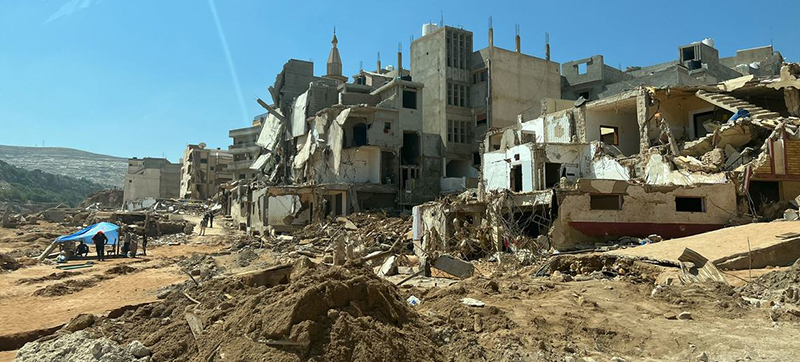Libya floods aftermath: Response continues amid the wreckage

UN teams are working tirelessly to deliver vital assistance to communities devastated by the unprecedented floods that hit eastern Libya.
Over the weekend, agency staff led missions into Derna, Shahat, Soussa and al Bayda, delivering emergency medical supplies, food, water purification kits and shelter material.
‘Horrific’ situation
The situation is “horrific” in Derna, said Rana Ksaifi, leading a UN refugee agency (UNHCR) team to the city.
Derna bore the brunt of the floods after two dams on the city’s outskirts collapsed, sending a torrent of water through the streets that swept entire buildings out to sea.
“I cannot explain what I saw on the way coming to Derna: roads split in half, massive rocks moved from the mountains to coastal areas, and destroyed homes,” she said.
According to the Libyan Red Crescent, over 11,000 people are reported dead there, with a further 10,100 missing. More than 30,000 people have been displaced out of a population of around 150,000 before the disaster.
‘Very slim’ chance of survivors
Though search and rescue efforts are ongoing, chances of finding survivors are “very slim”, said UN Humanitarian Coordinator in Libya, Georgette Gagnon, who also visited Derna in the aftermath of the flood.
“Given the nature and scope of this tragedy, we are very concerned about the health impact and the potential spread of waterborne diseases as water sources and sewer networks have been severely damaged,” she told reporters at UN Headquarters in New York on Monday.
Ms. Gagnon also expressed concern over the potential for floodwaters to have displaced landmines and unexploded ordinance (UXO) by the floodwaters, putting both residents and humanitarians at risk.
“The response is coming together, and we are trying to navigate the challenges of damaged infrastructure,” she added.
Averting a second crisis
UN World Health Organization (WHO) teams, along with local officials and partner organizations, are working to prevent diseases from taking hold and causing a second devastating crisis.
“This is a disaster of epic proportions,” said Ahmed Zouiten, WHO Representative in Libya.
On Sunday, the agency dispatched approximately 29 metric tonnes of medical supplies, brought from its contingency store in United Arab Emirates, to hospitals and primary health centres to help restore some functionality.
“We are saddened by the unspeakable loss of thousands of souls. Our thoughts are with the families who have lost loved ones, as well as with all of the affected communities. We are committed to providing the necessary support to restore health services for the affected population in eastern Libya,” Dr. Zouiten said.
Emergency appeal
UN agencies have also launched a $71.4 million emergency humanitarian appeal, in addition to $10 million released from the Central Emergency Response Fund (CERF), to provide lifesaving assistance and protection.
For an initial period between September-December, the Flash Appeal targets assistance for 250,000 most vulnerable among some 884,000 people in need.
According to the UN Office for the Coordination of Humanitarian Affairs (OCHA), critical needs identified so far include emergency healthcare, water and sanitation, food, and heavy equipment to clear tonnes of debris.
Assessments are ongoing, OCHA added.



